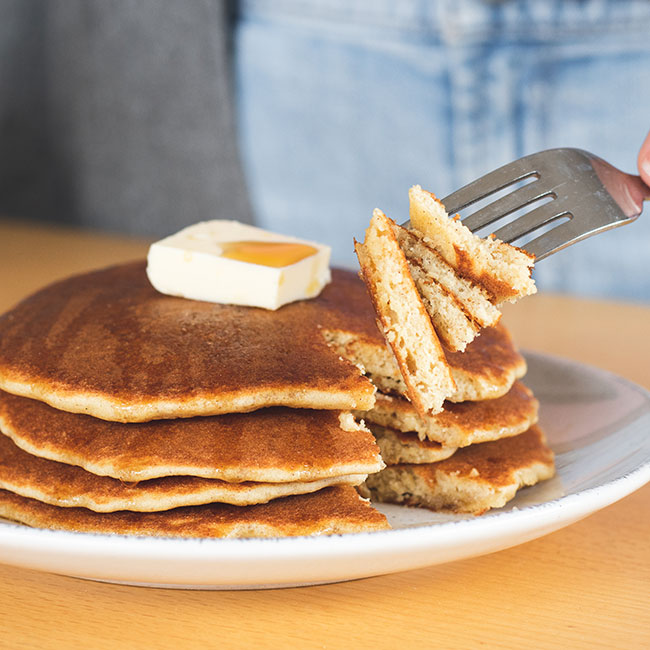
Final Proof: Millet full of potential for bakers
October 6, 2023
By Jane Dummer, RD
It’s a sustainable, versatile, mild-flavoured, nutritious, gluten-free ancient grain with potential
 Pancake made with 100 per cent millet flour.
PHOTO: EVERSPRING FARMS
Pancake made with 100 per cent millet flour.
PHOTO: EVERSPRING FARMS The Food and Agriculture Organization (FAO) of the United Nations has declared 2023 the International Year of Millets.
According to the Consulate of India in Toronto, millets make an important contribution to livelihood generation, food and nutritional security in various parts of the world. The humble millet has been grown in the Indian subcontinent for 5,000 years. These small-seeded, hardy crops are resilient in difficult climate conditions.
Dianne Wolters, vice-president product development, Everspring Farms concurs: “In terms of sustainability, millet is well suited to growing in hot and dry climates and can withstand drought conditions. It also requires less fertilizer than other crops and its fibrous root system is excellent for preventing soil erosion.”
In addition to being sustainable, millet is a nutritious, gluten-free ancient grain. Red proso millet has been grown on Reynald Gauthier’s farm in St-Claude, Man., since 1991. Gauthier, known as the “Millet King,” is a fourth-generation farmer who embraced the opportunity to work with this ancient cereal crop. He explains: “Millet is probably one of the best crops that you can seed on your farm. It can be used as food for human consumption, cattle feed and bird food. At Millet King Foods of Canada Inc., we’re launching our seventh product for consumers this fall. The products range from red millet beer and waffle/pancake mixes to whole millet flour and whole millet seeds. The new product launch is Millet King Krunchies Premium Cereal, which is manufactured in Toronto and can be ordered via the MilletKing.com website.”
In addition to being sustainable, millet is a nutritious, gluten-free ancient grain.
Millet provides fibre, protein, antioxidants, B vitamins plus the minerals iron and zinc. It has a mild flavour and adds crunch when used as a whole seed. Millets are largely associated with Indian cuisine and used in several dishes including idli, a steamed, fermented savoury cake. However, North American uses and applications of millets are gaining traction especially in baking. Millet makes an excellent substitution for wheat when making gluten-free baked goods and breads.
Elaine O’Doherty, Canada marketing lead, Ardent Mills, describes the consumer market: “In recent years, consumers have increasingly sought out products that are perceived as healthier and more functional food choices that fit their individual needs. In fact, according to Ardent Mills proprietary research, 70 per cent of gluten-free eaters already report an interest in buying/eating baked goods with millet and sorghum as an ingredient due to their perception of these grains. Because of this, its versatility and cost-efficiency, we at Ardent Mills view millet as an important part of our emerging nutrition product portfolio.”
Everspring Farms in Seaforth, Ont., has a variety of products including organic sprouted millet and sprouted millet flour. Wolters explains: “Using sprouted millet offers several advantages for baking applications. On its own, millet flour can be slightly bitter; however, the germination process helps to remove any bitter saponins and highlights the subtly sweet and nutty flavour of the flour. Sprouting can also reduce the level of phytic acid in millet, allowing our bodies to easily digest important minerals and enzymes. In terms of functionality, sprouted millet is light and crunchy making it an interesting addition as a topper or used in the dough to add a visual presence of whole seeds.”
O’Doherty says, “In the baking industry, we see millet most often used in the whole form as a topping and in traditional or gluten-free multigrain-style breads or as a flour in gluten-free baked goods. Within Ardent Mills’ product portfolio, we offer proso millet as whole seeds, flour and in custom multigrain blends. Because of its golden colour, texture, cost effectiveness and functional properties, millet blends well with other grains and flours. As a seed its delicate crunchy texture is the lead functional benefit, which contributes to its use as an inclusion or enrobing seed. As a flour it contributes to a desired cakey crumb and may help reduce gumminess. This is perfect for gluten-free breads, wraps and flatbreads. When used in a fermented application, millet has a clean sour flavour, ideal for traditional or gluten-free sourdoughs.”
Millet is a tiny sustainable, versatile, mild-flavoured, nutritious, gluten-free ancient grain with immense potential. From gluten-free sourdough breads and mixes to toppings and inclusions in baked goods, the baking applications are vast.
Jane Dummer, RD, known as the Pod to Plate Food Consultant, collaborates and partners with the food and nutrition industry across North America. janedummer.com
Print this page
Leave a Reply